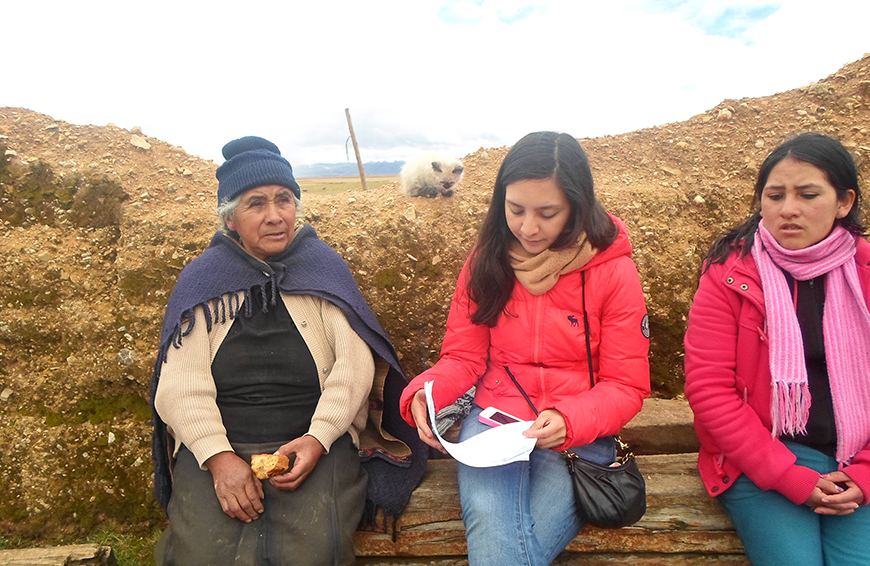
Researcher Maria Montenegro and an assistant interview a female farmer (left) in rural Peru about how inherited land rights affect her empowerment.
Maria Montenegro is not exaggerating when she says that researching her award-winning master's thesis in rural Peru was complicated. For starters, her initial subjects accused her of being with the CIA (Central Intelligence Agency).
"The community didn't want us to collect data there," said Montenegro, whose 2016 thesis was named "Outstanding MSc Thesis" by two agricultural economics organizations in Canada and the United States.
"Peru has a long history of issues over land, and peasant communities are very protective of their resources," said Montenegro, who was researching the effect of women's land rights on their empowerment for her degree from the Department of Resource Economics and Environmental Sociology.
With last-minute assistance from a non-profit organization working near her study area (a rural region seven hours from Lima), Montenegro shifted focus from the first subject group to six surrounding communities.
To unearth their data, she and her team conducted one-on-one interviews based on the Women's Empowerment in Agriculture Index, an international index of standardized measures,
"The index includes some lengthy questions," she said. "For example, it asked about every activity they do on a normal day. The interviews were an hour, and we had to wake up at 4 a.m. because the participants are livestock farmers and leave to the field very early. Then we'd go back from six to eight at night, for more interviews."
Montenegro found that women's land rights do indeed have a positive impact on their empowerment. She also discovered that if both men and women in a partnership have inherited land separately, the effect on women's empowerment was greater. Another finding is that men's solo inheritance of land can have a negative impact on women's empowerment.
"This really shows the importance of developing policies that consider the allocation of land, instead of just implementing a program that increases land holdings," she said.
Her thesis was supervised by development economists Brent Swallow and Sandeep Mohapatra. It received an award from the Canadian Agricultural Economics Society, during its annual meeting in Montreal in June, and will be named "Outstanding Master's Thesis" at the prestigious Agricultural and Applied Economics Association in the United States, during its Chicago conference in July.
Montenegro believes the study drew recognition because it fills an important gap she identified in the existing literature.
There is currently a push in the development field to increase women's land access, she said, noting that the current United Nations Sustainable Development Goals considers it a factor in three goals (no poverty, no hunger, and gender equality). In theory, that makes sense, said Montenegro. With ownership of their resources, women should have more ability to negotiate such things as credit and livestock transfers. However, there is little empirical evidence showing exactly what the effect of increasing women's land access is.
By defining land rights as "inherited land," Montenegro observed empowerment based on women's decision making: purchase or transfer of resources, distribution of income from productive assets and access to credit.
"Many other studies will ask, 'Do you have decision-making power over your household's expenditures?' and use only one dimension to decide if women are empowered or not," said Montenegro. "However, there are so many ways of being empowered. My study's methodology is really taking these different dimensions into account."